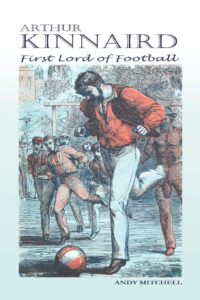Book Review: Arthur Kinnaird – First Lord of Football by Andy Mitchell
 An excellent biography of an extraordinary man.
An excellent biography of an extraordinary man.
If you haven’t already delved into Victorian football this book will whet your appetite and also provide you with new opportunities to explore the early years of what is now the Global Game through, to give him his full title, Arthur Fitzgerald Kinnaird, the 11th Lord Kinnaird.
Just where do you start with this man of many facets? Kinnaird the footballer? The humanitarian? The politician? The administrator?
Of all these, prior to reading this book I was aware of Arthur Kinnaird’s’ exploits in football from my interest and knowledge of the FA Cup, especially during the Victorian era, with an additional insight provided by the Netflix mini-series The English Game, which although not totally historically accurate was an otherwise excellent programme.
Author Andy Mitchell has written a number of other football books, primarily concerning Scottish football, and here he has utilised a great source for this biography, with access to the family records and Arthur Kinnaird’s personal papers and scrapbooks through Kinnaird’s great-granddaughter, the Hon. Caroline Best, proving invaluable. Overall, the book is well written and concise, although I would have preferred some expansion in some areas of the book. The source material though enables Michell to provide readers with detail of his life outside of his football career, which in itself was so influential.
Despite Kinnaird’s Old Etonian education and wealthy family background he was extremely pious and cared greatly for social issues especially those affecting the poor. Along with his wife he used these attributes to be influential in the establishment of the YMCA and YWCA. Indeed, his early philanthropic leanings saw the couple teaching the children of the poor to read and write, with Kinnaird involved himself in a range of areas specifically those of a humanitarian nature covering education (for the poor and refugees), religion, poverty relief and health, as well as political and financial. As a Member of the House of Lords, he was a politician with a conscience, something those in positions of power and wealth today would do well to remember.
Kinnaird’s legacy to football came in two ways. On the pitch as a player, he was undeniably the superstar of his day, the Victorian Pele, Maradona, Ronaldo or Messi. Mitchell details his football career quite extensively, covering the great teams of the period with Kinnaird playing for Wanderers and Old Etonians, earning himself five winners’ medals from the nine appearances he made in FA Cup finals between 1873 and 1883. Additionally, he was involved in setting up the first international games between England and Scotland, and despite being born in London, as a son of an old Perthshire family, he turned out for the Scots.
Off the pitch, he was involved in the evolution of football as an administrator, where Kinnaird worked hard to standardise the rules of game and was involved in the formation of the English Football Association (The FA), serving as President for 33 years. During his stewardship, he oversaw the introduction of professionalism within the game, as the influence of the Southern public schools and the upper classes was usurped by the North and its professional teams, with this battle also featured within the aforementioned Netflix series.
Besides Kinnaird’s story, what I also loved about the book were the reproduction of newspaper articles and memorabilia from his own scrapbook which paves the way for readers to exploring more about football in the Victorian era in conjunction with an extensive bibliography.
Purely from a football perspective, this is where I would have wanted more, however, the reality is this is a biography of the man, not simply a history of Victorian football. Readers should be aware that the author assumes a level of knowledge around the formation and tactics of the Victorian game which were significantly different to that the modern fan is used to, and which evolved during Kinnaird’s playing and administrative career.
Overall though Mitchell has produced an excellent read and as I say will lead the curious amongst readers down a wormhole through the origins of the Victorian game and one of its significant influencers.
Steve Blighton
(Independently Published. March 2020. Paperback: 189 pages)


